" Today Tibet-Tomorrow Viet Nam "
" Today Tibet-Tomorrow Viet Nam "
South China Sea tension mounts near Filipino shipwreck
-
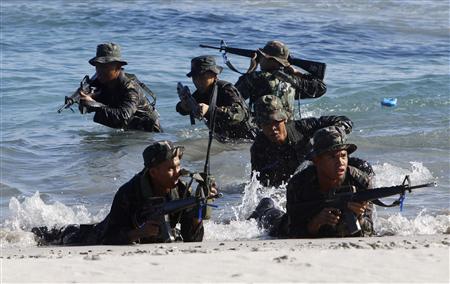 View Photo
View PhotoReuters/Reuters - Philippine Military Academy (PMA) cadets take up positions for assault on a beach during a joint field training exercise at the Marines' training centre in Ternate, Cavite city, south of Manila …more May 29, 2013. REUTERS/Romeo Ranoco less
- View Photo
Reuters/Reuters - Philippine Military Academy (PMA) cadets take up positions for assault on a beach during a joint field training exercise at the Marines' training centre in Ternate, Cavite city, south of Manila …more May 29, 2013. REUTERS/Romeo Ranoco less
-
 View Photo
View Photo Philippine Military Academy (PMA) …
 View Photo
View Photo Philippine Military Academy (PMA) …
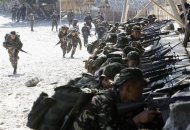 View Photo
View Photo Philippine Military Academy (PMA) …
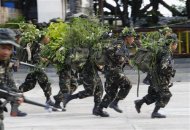 View Photo
View Photo Cadets of the Philippine Military …
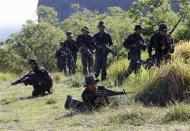 View Photo
View Photo Cadets of the Philippine Military …
By Manuel Mogato
MANILA (Reuters) - A wrecked navy transport ship perched on a remote coral reef could be the next flashpoint in the South China Sea, where China and five other claimants bitterly dispute territory.
The Philippines is accusing China of encroachment after three Chinese ships, including a naval frigate, converged just 5 nautical miles from an old transport ship that Manila ran aground on a reef in 1999 to mark its territory.
Philippine officials say they fear the Chinese ships will block supplies to about a dozen Filipino marines stationed in abject conditions on the rusting ship, raising tensions over one of Asia's biggest security issues.
The area, known as Second Thomas Shoal, is a strategic gateway to Reed Bank, believed to be rich in oil and natural gas. In 2010, Manila awarded an Anglo-Filipino consortium a license to explore for gas on Reed Bank but drilling stalled last year due to the presence of Chinese ships.
Manila says Reed Bank, about 80 nautical miles west of Palawan island at the southwestern end of the Philippine archipelago, is within the country's 200-nautical mile exclusive economic zone.
Beijing says it is part of the Spratlys, a group of 250 uninhabitable islets spread over 165,000 square miles, claimed entirely by China, Taiwan and Vietnam and in part by Malaysia, Brunei and the Philippines.
"China should pull out of the area because under international law, they do not have the right to be there," said Raul Hernandez, a spokesman for the Philippine Department of Foreign Affairs, noting the area's proximity to Palawan, the country's largest province. He said the Chinese ships were a "provocation and illegal presence".
Chinese Foreign Ministry spokesman Hong Lei said on Tuesday the Second Thomas Shoal was part of the Spratly Islands, over which China had "indisputable sovereignty".
"It is beyond reproach for Chinese boats to carry out patrols in these waters," Hong said, adding China called on all parties to "refrain from taking actions that complicate the situation".
CHINA REPORT WARNS OF CRISIS AHEAD
The tension illustrates how a decades-old territorial squabble over the South China Sea is entering a more contentious chapter as claimant nations spread deeper into disputed waters in search of energy supplies, while building up navies and alliances with other nations.
Vietnam this week again accused China of endangering the lives of its fishermen with the ramming of a trawler in the South China Sea.
"The actions of the Chinese vessels have seriously violated Vietnam's sovereignty, sovereign rights and jurisdiction in the East Sea, threatening lives and property damage of Vietnam's fishermen," Foreign Ministry spokesman Luong Thanh Nghi said in a statement posted on Tuesday. Vietnam handed a diplomatic note the Chinese Embassy in Hanoi to protest the incident.
China said it was merely acting to prevent illegal fishing in Chinese waters, adding that Vietnam's accusations "did not accord with the facts".
A report issued on Tuesday by Chinese military think tank the Centre for National Defence Policy said it was the U.S. "pivot" back to Asia which had "shattered" the relative calm of the South China Sea, warning of crisis ahead.
"While the conditions do not yet exist for a large-scale armed clash, the dispute is becoming normalized and long-term ... and ineffective management may lead to a serious crisis," the report said, according to the China News Service.
The tension comes just before U.S. Defense Secretary Chuck Hagel meets his Asia-Pacific counterparts at the so-called Shangri-La Dialogue in Singapore at the weekend. The South China Sea is on the agenda of the regional security forum.
Second Thomas Shoal is one of several possible flashpoints in the South China Sea that could force the United States to intervene in defence of its Southeast Asian allies.
"CLEAR AND PRESENT DANGER"
As of Tuesday, two Chinese marine surveillance ships remained in the area, Philippine navy spokesman Colonel Edgardo Arevalo said, adding the fishing boats and the frigate had left.
"The presence of those ships is a clear and present danger," said another senior Philippine navy officer, who declined to be identified as he is not authorized to speak to media. He said the Philippines believed China was trying to pressure it to leave the shoal.
"We don't want to wake up one day with fresh structures sitting near our navy ship there. We have to bite the bullet and strengthen our position there or risk losing the territory."
The Association of South East Asian Nations (ASEAN), a 10-nation grouping that includes the Philippines, has been talking to China about a binding code of conduct to ease tension. But China says it will negotiate "when the time is ripe".
ASEAN foreign ministers are due to meet in Thailand in August to forge a position on the code of conduct before meeting Chinese officials in late August or early September in Beijing.
Zha Daojiong, an international relations professor at Beijing's Peking University, said China was serious about asserting its claims in the South China Sea.
"There is now a quiet agreement among different Chinese voices that sometimes you have to act as well as issuing statements," he said.
Ian Storey, a scholar at Singapore's Institute of South East Asian Studies, said tension at Second Thomas Shoal could prove more dangerous than last year's stand-off at unoccupied Scarborough Shoal, given the presence of Filipino troops.
"It is hard to imagine China using force to gain full control over Second Thomas, but some kind of blockade to drive out the Philippines' troops would have to be a possibility," Storey said. "There is a real chance of escalation or miscalculation."
(Additional reporting by Greg Torode in Hong Kong, Martin Petty in Hanoi and Terril Jones and Ben Blanchard in Beijing; Editing by Jason Szep, Robert Birsel and Michael Perry)
-
View Photo
Philippine Military Academy (PMA) …
View Photo
Philippine Military Academy (PMA) …
View Photo
Philippine Military Academy (PMA) …
View Photo
Cadets of the Philippine Military …
View Photo
Cadets of the Philippine Military …
By Manuel Mogato
MANILA (Reuters) - A wrecked navy transport ship perched on a remote coral reef could be the next flashpoint in the South China Sea, where China and five other claimants bitterly dispute territory.
The Philippines is accusing China of encroachment after three Chinese ships, including a naval frigate, converged just 5 nautical miles from an old transport ship that Manila ran aground on a reef in 1999 to mark its territory.
Philippine officials say they fear the Chinese ships will block supplies to about a dozen Filipino marines stationed in abject conditions on the rusting ship, raising tensions over one of Asia's biggest security issues.
The area, known as Second Thomas Shoal, is a strategic gateway to Reed Bank, believed to be rich in oil and natural gas. In 2010, Manila awarded an Anglo-Filipino consortium a license to explore for gas on Reed Bank but drilling stalled last year due to the presence of Chinese ships.
Manila says Reed Bank, about 80 nautical miles west of Palawan island at the southwestern end of the Philippine archipelago, is within the country's 200-nautical mile exclusive economic zone.
Beijing says it is part of the Spratlys, a group of 250 uninhabitable islets spread over 165,000 square miles, claimed entirely by China, Taiwan and Vietnam and in part by Malaysia, Brunei and the Philippines.
"China should pull out of the area because under international law, they do not have the right to be there," said Raul Hernandez, a spokesman for the Philippine Department of Foreign Affairs, noting the area's proximity to Palawan, the country's largest province. He said the Chinese ships were a "provocation and illegal presence".
Chinese Foreign Ministry spokesman Hong Lei said on Tuesday the Second Thomas Shoal was part of the Spratly Islands, over which China had "indisputable sovereignty".
"It is beyond reproach for Chinese boats to carry out patrols in these waters," Hong said, adding China called on all parties to "refrain from taking actions that complicate the situation".
CHINA REPORT WARNS OF CRISIS AHEAD
The tension illustrates how a decades-old territorial squabble over the South China Sea is entering a more contentious chapter as claimant nations spread deeper into disputed waters in search of energy supplies, while building up navies and alliances with other nations.
Vietnam this week again accused China of endangering the lives of its fishermen with the ramming of a trawler in the South China Sea.
"The actions of the Chinese vessels have seriously violated Vietnam's sovereignty, sovereign rights and jurisdiction in the East Sea, threatening lives and property damage of Vietnam's fishermen," Foreign Ministry spokesman Luong Thanh Nghi said in a statement posted on Tuesday. Vietnam handed a diplomatic note the Chinese Embassy in Hanoi to protest the incident.
China said it was merely acting to prevent illegal fishing in Chinese waters, adding that Vietnam's accusations "did not accord with the facts".
A report issued on Tuesday by Chinese military think tank the Centre for National Defence Policy said it was the U.S. "pivot" back to Asia which had "shattered" the relative calm of the South China Sea, warning of crisis ahead.
"While the conditions do not yet exist for a large-scale armed clash, the dispute is becoming normalized and long-term ... and ineffective management may lead to a serious crisis," the report said, according to the China News Service.
The tension comes just before U.S. Defense Secretary Chuck Hagel meets his Asia-Pacific counterparts at the so-called Shangri-La Dialogue in Singapore at the weekend. The South China Sea is on the agenda of the regional security forum.
Second Thomas Shoal is one of several possible flashpoints in the South China Sea that could force the United States to intervene in defence of its Southeast Asian allies.
"CLEAR AND PRESENT DANGER"
As of Tuesday, two Chinese marine surveillance ships remained in the area, Philippine navy spokesman Colonel Edgardo Arevalo said, adding the fishing boats and the frigate had left.
"The presence of those ships is a clear and present danger," said another senior Philippine navy officer, who declined to be identified as he is not authorized to speak to media. He said the Philippines believed China was trying to pressure it to leave the shoal.
"We don't want to wake up one day with fresh structures sitting near our navy ship there. We have to bite the bullet and strengthen our position there or risk losing the territory."
The Association of South East Asian Nations (ASEAN), a 10-nation grouping that includes the Philippines, has been talking to China about a binding code of conduct to ease tension. But China says it will negotiate "when the time is ripe".
ASEAN foreign ministers are due to meet in Thailand in August to forge a position on the code of conduct before meeting Chinese officials in late August or early September in Beijing.
Zha Daojiong, an international relations professor at Beijing's Peking University, said China was serious about asserting its claims in the South China Sea.
"There is now a quiet agreement among different Chinese voices that sometimes you have to act as well as issuing statements," he said.
Ian Storey, a scholar at Singapore's Institute of South East Asian Studies, said tension at Second Thomas Shoal could prove more dangerous than last year's stand-off at unoccupied Scarborough Shoal, given the presence of Filipino troops.
"It is hard to imagine China using force to gain full control over Second Thomas, but some kind of blockade to drive out the Philippines' troops would have to be a possibility," Storey said. "There is a real chance of escalation or miscalculation."
(Additional reporting by Greg Torode in Hong Kong, Martin Petty in Hanoi and Terril Jones and Ben Blanchard in Beijing; Editing by Jason Szep, Robert Birsel and Michael Perry)
China Is Winning the Cyber War Because They Hacked U.S. Plans for Real War
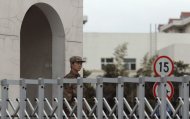 View Photo
View Photo China Is Winning the Cyber War …
Ballistic-missile defenses, joint-strike fighters, Black Hawks, and more — Chinese hackers have their hands on plans for these and more of the Pentagon's most sophisticated weapons systems, just the latest sign that the culture of hacking inChina continues to put America on the defensive ahead of a tense meeting between President Obama and Xi Jinping, a summit bound to be tense with cyberwarfare diplomacy.
RELATED: US Intelligence Says It's Not Just China Spying on Us
The Washington Post's Ellen Nakashima reports in Tuesday's paper that Chinese cyberthieves have "compromised" mockups that form the "backbone" of some of the U.S. military's most important and high-tech defense technology, and that it could signal a copycat advancement of China's arms, while aiming to "weaken the U.S. military advantage" down the road. The Chinese government, as usual with these attacks — even when they seem connected directly to the People's Liberation Army — are distancing themselves from the pervasive, and this time very internationally unsound, hacking. "The Defense Science Board, a senior advisory group made up of government and civilian experts, did not accuse the Chinese of stealing the designs. But senior military and industry officials with knowledge of the breaches said the vast majority were part of a widening Chinese campaign of espionage against U.S. defense contractors and government agencies," the Post reports.
RELATED: China Says U.S. Is on Offense in Hacking Attacks on Defense Ministry
The new breach comes as a newly disclosed part of a classified Defense Science Board report. Back in January, the boardreleased a public version of the report, warning of possible attacks on U.S. defense systems as well as the Defense Department's lack of preparation and protection. And if you look back in 2005, the same group warned U.S. defense officials against buying microchips from China because of trojan horses and spyware — advice the Pentagon eventually took, cutting off Chinese supply in 2011. But in just the last few months, Chinese hackers have gotten to major U.S. news organizationsand government agencies. How have the Pentagon's own cybersecurity experts been so far ahead of the Pentagon's actual cybersecurity if China is stealing our war plans — or at least our warplanes? And is there any way to stop it?
RELATED: China Is Culturally Superior to America
Obama has said that the U.S. military would focus on Asia and the Pacific in the coming year — he called it a "vast and complex undertaking" in his big foreign-policy speech on Thursday. "We cannot look back years from now and wonder why we did nothing in the face of real threats to our security and our economy," Obama said in his State of the Union addressthis year. Except it may be too late for wonder and speeches; Nakashima reports the Chinese cyberspies already have the basic outlines for the following:
The designs included those for the advanced Patriot missile system, known as PAC-3; an Army system for shooting down ballistic missiles, known as the Terminal High Altitude Area Defense, or THAAD; and the Navy's Aegis ballistic-missile defense system.
Also identified in the report are vital combat aircraft and ships, including the F/A-18 fighter jet, the V-22 Osprey, the Black Hawk helicopter and the Navy's new Littoral Combat Ship, which is designed to patrol waters close to shore. Also on the list is the most expensive weapons system ever built — the F-35 Joint Strike Fighter, which is on track to cost about $1.4 trillion.
So while that big Mandiant report from February — the one linking a nondescript building all the way to the PLA and back to critical U.S. infrastructure, the one the Pentagon outright blamed on the Chinese government — might be scary, this is a cyber race to weapons building. And it's got implications for future combat: "You've seen significant improvements in Chinese military capabilities through their willingness to spend, their acquisitions of advanced Russian weapons, and from their cyber-espionage campaign," James A. Lewis, a cyber-policy expert at the Center for Strategic and International Studies, told thePost's Nakashima.
RELATED: China Laughs at India's 'Dwarf' Missile
According to a report last weekby the Commission on the Theft of American Intellectual Property, a group headed up by two ex-Obama administration officials (Dennis Blair and Jon Huntsman), hacking costs the U.S. some $300 billion per year. And you know what? China is reportedly responsible for a full 70 percent of that when it comes to corporate IP and theft. But aNew York Times editorial over the weekend added an important point of emphasis: "While there are concerns about military-related incursions, the focus of most public discussion surrounds hacking into business and industry." Behind the scenes, then, the Pentagon is doing more than it's saying — and building up a more sophisticated cyber battle plan of our own:Wired's Noah Shachtman has an in-depth report today on the Pentagon's so-called Plan X, "a program that is specifically working towards building the technology infrastructure that would allow cyber offense to move from the world we're in today," as Darpa's director put it.
RELATED: Google Says Someone In China Tried to Hack U.S. Officials's Gmail
Whether videogame-style protections and clandestine preparations will bail out the Pentagon the next time around, well, we may never know. But we know the U.S. isn't the only victim of military-grade cyber espionage: Australian media reported over the American long weekened that the Chinese had hacked blueprints of the Australian Security Intelligence Organisation's new headquarters. The "blueprints included floor plans and the locations of communications cabling, servers and security systems," reports the Australian Broadcasting Corporation. So, it wouldn't be that hard to imagine China creating U.S. weapons in a building designed by Australia's ASIO, now would it?
Obama is expected to discuss the Chinese hacks — and the widespread culture of hacking in China, which is increasingly looking more like war games than hobby horse — with Chinese President Xi Jinping when they meet next month in California. There might have to be digital ground rules if we want to keep our planes from taking off over Chinese skies.
View Photo
China Is Winning the Cyber War …
Ballistic-missile defenses, joint-strike fighters, Black Hawks, and more — Chinese hackers have their hands on plans for these and more of the Pentagon's most sophisticated weapons systems, just the latest sign that the culture of hacking inChina continues to put America on the defensive ahead of a tense meeting between President Obama and Xi Jinping, a summit bound to be tense with cyberwarfare diplomacy.
RELATED: US Intelligence Says It's Not Just China Spying on Us
The Washington Post's Ellen Nakashima reports in Tuesday's paper that Chinese cyberthieves have "compromised" mockups that form the "backbone" of some of the U.S. military's most important and high-tech defense technology, and that it could signal a copycat advancement of China's arms, while aiming to "weaken the U.S. military advantage" down the road. The Chinese government, as usual with these attacks — even when they seem connected directly to the People's Liberation Army — are distancing themselves from the pervasive, and this time very internationally unsound, hacking. "The Defense Science Board, a senior advisory group made up of government and civilian experts, did not accuse the Chinese of stealing the designs. But senior military and industry officials with knowledge of the breaches said the vast majority were part of a widening Chinese campaign of espionage against U.S. defense contractors and government agencies," the Post reports.
RELATED: China Says U.S. Is on Offense in Hacking Attacks on Defense Ministry
The new breach comes as a newly disclosed part of a classified Defense Science Board report. Back in January, the boardreleased a public version of the report, warning of possible attacks on U.S. defense systems as well as the Defense Department's lack of preparation and protection. And if you look back in 2005, the same group warned U.S. defense officials against buying microchips from China because of trojan horses and spyware — advice the Pentagon eventually took, cutting off Chinese supply in 2011. But in just the last few months, Chinese hackers have gotten to major U.S. news organizationsand government agencies. How have the Pentagon's own cybersecurity experts been so far ahead of the Pentagon's actual cybersecurity if China is stealing our war plans — or at least our warplanes? And is there any way to stop it?
RELATED: China Is Culturally Superior to America
Obama has said that the U.S. military would focus on Asia and the Pacific in the coming year — he called it a "vast and complex undertaking" in his big foreign-policy speech on Thursday. "We cannot look back years from now and wonder why we did nothing in the face of real threats to our security and our economy," Obama said in his State of the Union addressthis year. Except it may be too late for wonder and speeches; Nakashima reports the Chinese cyberspies already have the basic outlines for the following:
The designs included those for the advanced Patriot missile system, known as PAC-3; an Army system for shooting down ballistic missiles, known as the Terminal High Altitude Area Defense, or THAAD; and the Navy's Aegis ballistic-missile defense system.
Also identified in the report are vital combat aircraft and ships, including the F/A-18 fighter jet, the V-22 Osprey, the Black Hawk helicopter and the Navy's new Littoral Combat Ship, which is designed to patrol waters close to shore. Also on the list is the most expensive weapons system ever built — the F-35 Joint Strike Fighter, which is on track to cost about $1.4 trillion.
So while that big Mandiant report from February — the one linking a nondescript building all the way to the PLA and back to critical U.S. infrastructure, the one the Pentagon outright blamed on the Chinese government — might be scary, this is a cyber race to weapons building. And it's got implications for future combat: "You've seen significant improvements in Chinese military capabilities through their willingness to spend, their acquisitions of advanced Russian weapons, and from their cyber-espionage campaign," James A. Lewis, a cyber-policy expert at the Center for Strategic and International Studies, told thePost's Nakashima.
RELATED: China Laughs at India's 'Dwarf' Missile
According to a report last weekby the Commission on the Theft of American Intellectual Property, a group headed up by two ex-Obama administration officials (Dennis Blair and Jon Huntsman), hacking costs the U.S. some $300 billion per year. And you know what? China is reportedly responsible for a full 70 percent of that when it comes to corporate IP and theft. But aNew York Times editorial over the weekend added an important point of emphasis: "While there are concerns about military-related incursions, the focus of most public discussion surrounds hacking into business and industry." Behind the scenes, then, the Pentagon is doing more than it's saying — and building up a more sophisticated cyber battle plan of our own:Wired's Noah Shachtman has an in-depth report today on the Pentagon's so-called Plan X, "a program that is specifically working towards building the technology infrastructure that would allow cyber offense to move from the world we're in today," as Darpa's director put it.
RELATED: Google Says Someone In China Tried to Hack U.S. Officials's Gmail
Whether videogame-style protections and clandestine preparations will bail out the Pentagon the next time around, well, we may never know. But we know the U.S. isn't the only victim of military-grade cyber espionage: Australian media reported over the American long weekened that the Chinese had hacked blueprints of the Australian Security Intelligence Organisation's new headquarters. The "blueprints included floor plans and the locations of communications cabling, servers and security systems," reports the Australian Broadcasting Corporation. So, it wouldn't be that hard to imagine China creating U.S. weapons in a building designed by Australia's ASIO, now would it?
Obama is expected to discuss the Chinese hacks — and the widespread culture of hacking in China, which is increasingly looking more like war games than hobby horse — with Chinese President Xi Jinping when they meet next month in California. There might have to be digital ground rules if we want to keep our planes from taking off over Chinese skies.
China army to conduct first "digital" exercise
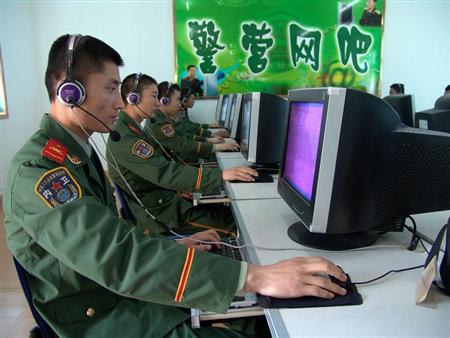 View Photo
View PhotoReuters/Reuters - Chinese soldiers surf the Internet at an Internet bar in an army base in Huaibei, in eastern China's Anhui province, April 14, 2005.
BEIJING (Reuters) - China will next month conduct its first "digital" technology military exercise, state media said on Wednesday, against growing concern in Washington and elsewhere about Chinese hacking attacks.
A brief report by the official Xinhua news agency said the exercise, in north China's remote Inner Mongolia region, will "test new types of combat forces including units using digital technology amid efforts to adjust to informationalized war".
"It will be the first time a People's Liberation Army exercise has focused on combat forces including digitalized units, special operations forces, army aviation and electronic counter forces," the brief English-language report added.
President Barack Obama will discuss cyber security with Chinese President Xi Jinping during a meeting in California next week, as Washington becomes increasingly worried about Chinese hacking of U.S. military networks.
The Pentagon underscored its concerns in a report to Congress earlier this month, accusing China of using cyber espionage to modernize its military. It said the U.S. government has been the target of hacking that appeared to be "attributable directly to the Chinese government and military".
In Australia this week, a report by Australia's ABC Television said hackers linked to China stole the floor plans of a new A$630 million headquarters for the Australia Security Intelligence Organization, the country's domestic spy agency.
The Chinese government has repeatedly denied any involvement in hacking attacks, even as it steps up defense spending and develops new technologies such as aircraft carriers and stealth fighters.
(This story corrects the timing of the exercise to next month, not next week)
(Reporting by Ben Blanchard)
- View Photo
Reuters/Reuters - Chinese soldiers surf the Internet at an Internet bar in an army base in Huaibei, in eastern China's Anhui province, April 14, 2005.
BEIJING (Reuters) - China will next month conduct its first "digital" technology military exercise, state media said on Wednesday, against growing concern in Washington and elsewhere about Chinese hacking attacks.
A brief report by the official Xinhua news agency said the exercise, in north China's remote Inner Mongolia region, will "test new types of combat forces including units using digital technology amid efforts to adjust to informationalized war".
"It will be the first time a People's Liberation Army exercise has focused on combat forces including digitalized units, special operations forces, army aviation and electronic counter forces," the brief English-language report added.
President Barack Obama will discuss cyber security with Chinese President Xi Jinping during a meeting in California next week, as Washington becomes increasingly worried about Chinese hacking of U.S. military networks.
The Pentagon underscored its concerns in a report to Congress earlier this month, accusing China of using cyber espionage to modernize its military. It said the U.S. government has been the target of hacking that appeared to be "attributable directly to the Chinese government and military".
In Australia this week, a report by Australia's ABC Television said hackers linked to China stole the floor plans of a new A$630 million headquarters for the Australia Security Intelligence Organization, the country's domestic spy agency.
The Chinese government has repeatedly denied any involvement in hacking attacks, even as it steps up defense spending and develops new technologies such as aircraft carriers and stealth fighters.
(This story corrects the timing of the exercise to next month, not next week)
(Reporting by Ben Blanchard)
Xin gởi đến quí bạn toàn bộ 8 tập của phim "VIETNAM! VIETNAM!".
Xin gởi đến quí bạn toàn bộ 8 tập của phim "VIETNAM! VIETNAM!". |









 |
| Reply via web post | Reply to sender | Reply to group | Start a New Topic | Messages in this topic (1) |
VN - News !
Diễn đàn phổ biến và trao đỗi tin tức vs tất cả các vấn đề liên quang đến đất nước và con người VN.
Lưu ý:
+ Diễn đàn không chấp nhận "Cross Post", tức là post cùng một lúc đến với nhiều đí chỉ khác nhau.
+ Bài post phải trình bày gọn gàng sạch sẽ và rõ ràng.
+ Nội dung và ý kiến của thành viên không phải là lập trường chính kiến của diễn đàn.
*************************







No comments:
Post a Comment